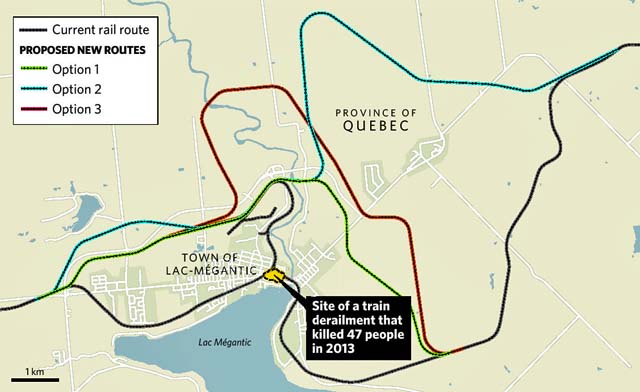
Lake Megantic Quebec - Isabelle Boulanger still counts herself among the haunted nearly four years after the deadly 2013 rail disaster in the Quebec town of Lake Megantic.
Four years since her son, Frederic Boutin, was among the 47 people killed in the fiery crash, since the 19-year-old, who had been at a popular local bar, the Musi-Cafe, with friends the night of 5 Jul 2013, crossed the street to his second-floor apartment on the town's main strip, where the crash occurred at about 01:15 the next morning.
"It appears he tried to escape his residence when the burning oil slick washed out from the site of the derailment toward the lake, setting the downtown alight as it passed," the Quebec coroner's report concluded.
They recovered the young man's remains in an alley behind the building and identified him through dental records and a tattoo.
Boulanger, who lives one town over in Frontenac, still can't bring herself to cross through the rebuilt downtown section of Lake Megantic.
She is still traumatized, still remembers searching for him, checking hospitals, asking strangers in vain.
"My skin crawls every time I hear a siren, whether it be the fire department, police, an ambulance, or the train," she said.
Now, the thing she has been avoiding is coming at her head-on.
A plan to build a bypass track around Lake Megantic rather than through its raw and still-recovering heart would likely result in it rumbling less than 500 metres from Boulanger's home.
"It probably comes as no surprise that we don't want to see the train passing by our place every day. That is a given," she said.
The chorus of calls to reroute the railway has been loud and consistent ever since the unattended 72 car train hauling 7.7 million litres of crude oil mixed with volatile chemicals barrelled into town at 105 kilometres-an-hour on 6 Jul 2013 and skipped the track at the north end of the town's main strip.
"Ever since the 7th of July there has never been a single day where the position of the town of Lake Megantic has been to not demand a bypass," said Marie-Claude Arguin, the town's director general.

Lake Megantic has the support of the neighbouring municipalities of Nantes and Frontenac, which are also affected by the potential changes.
The Quebec government is on board and Prime Minister Justin Trudeau promised earlier this year to fast-track the obligatory period of study and evaluation, possibly leading to construction by 2019.
A key regulatory hurdle gets underway this week when a provincial environmental panel holds a public hearing into the proposed project.
The city says the bypass is critical to attract new businesses to town and grow the economy, but also to help its people heal, Arguin said.
Health officials say there has been a reduction in the number of cases of post-traumatic stress, but a recent spike in cases of anxiety and depression among those considered to have had "strong exposure" to the disaster.
Among other indicators, the use of tranquilizer and anti-anxiety medication among the most exposed population has jumped to 29 percent in 2016 from 16 percent a year before, according to a January 2017 report, which noted that lingering problems are normal after such a trauma.
"This is even more true when a community that is affected by a catastrophe is then exposed to diverse stresses that have resulted from the catastrophe.
In the region we have seen many sources of stress related to the lawsuit, to the demolition and reconstruction of the downtown, as well as the issue of the rail bypass," the report noted.
But in submitting the population health studies along with the engineering plans for the new railway tracks, proponents are making the not-so-subtle point that moving the railway is as much an investment in collective healing as it is a question of infrastructure dollars and cents.
The option that has emerged as the favourite and the most likely to be endorsed is a 12 kilometre route that wraps around the town's residential area at a projected cost of $112 million.
The other two proposed diversions, at estimated costs of $139 million and $220 million, would continue to serve Lake Megantic's industrial zone, but take long meandering turns into the countryside before reconnecting with the existing tracks.
Gaynor Ryan, chief administrative officer of the Central Maine & Quebec Railway (CMQ), which owns and operates the tracks, said the company has no preferred route.
"We support whatever solution is best for the community."
But the closer the community gets to a decision, the more those who will be affected are expressing their displeasure.
Renee Lacombe, who operates a traditional Quebecois sugar shack located next to a highway at the northern entrance into town, is among them.
She has already had her stand of maple trees divided into two lots with the construction of a ring-road in 2011 to divert cars and trucks around Lake Megantic rather than through the town.
That nuisance proved to be a business blessing, exposing passing drivers to the sweet offerings she has been producing for 33 years.
Now, Lacombe's family jokes that perhaps customers might one day come by train.
The new tracks are slated to run through what is currently her parking lot.
"I don't see it as a good solution," she said.
"I would have gone a lot further, away from all the farm land and not near any residence, because there is a house not very far from it either."
Many houses, in fact. Lake Megantic's newspaper, l'Echo de Frontenac, reported in March that residents opposed to the rail bypass launched a petition that was sent to the federal and provincial officials elected to represent the region.
They are asking for the project to be suspended and for rail-safety regulations to instead be improved and properly enforced.
Among the signatories are those property owners facing expropriation and those who are facing the prospect of train tracks carving a line through their land.
One person had their property expropriated when the province built the ring-road for cars and trucks around Lake Megantic and is now staring down the train, the newspaper reported.
Arguin, Lake Megantic's director general, said the town is sympathetic, but faces an impossible task of trying to please everyone.
"If there was an option where there wasn't any citizen affected of course that would be the one chosen, but it's not that easy."
But Boulanger sees a more appropriate and enduring solution to the predicament in more stringent rail safety rules enforced by inspectors who have public safety rather than the efficacy of railroad company operations at heart.
Rules like those regarding the safety and maintenance of tracks, which resulted in drastic speed limits being in place at the time of the crash.
"It took a tragic accident like what happened on 6 Jul 2013 for people to begin to fear the train, but the danger was always there," she said.
"I understand they are traumatized. Even I still have difficulty with sirens and the noise of the train, so I understand them, except that even if they move the tracks, they're just moving the problem into someone else's yard."
Allan Woods.
of the Canadian Copyright Modernization Act.


